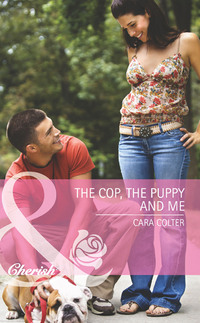
Полная версия
Tempted By The Single Dad
Allie began to giggle. Okay, it might have had a tiny bit of a hysterical edge to it.
“I fail to see the humor,” he said tightly. “It’s been on the news. There have been break-ins in this neighborhood. Mavis would be very vulnerable.”
She giggled harder. “I’m not the intruder. You’re the intruder.”
He let go of her shoulders completely, and looked down at her, his brow knit in consternation. “Who are you?”
“Who am I?” she sputtered. “I live here. I think the question is, who are you? And how dare you just walk into my home?”
“Your home?” The frown deepened around the exquisite corners of a wide mouth.
“I’ve rented this cottage from Mavis, in this time period, every year for the past ten years. My mom and dad rented it before that. That’s why I have my own key.”
What? Allie thought, completely taken off guard. She noted his voice was a masculine and sexy rasp. She could still feel her upper arms tingling from where he had held her fast.
Now that there was, obviously, no threat, her thoughts wandered. She despised herself for the wish that flitted through her mind: that her hair was not rumpled, towel-dried from her last swim, the tips still a shockingly different color than the rest of her blond hair. She wished she was not standing there, barefoot, in a too-large T-shirt that ended just past the shorts she had pulled on over a still-damp bathing suit.
Allie actually wished she had makeup on, which was totally against the cottage rules.
She snapped her mouth shut, since it had fallen open as she struggled to make the leap from home invader to well, home invader. Suddenly, it didn’t seem very funny at all, and the giggle, hysterical or otherwise, died within her. He didn’t know, and she hated being the one to break it to him.
“Mavis is my grandmother.” Somehow, she couldn’t bring herself to say was as if that would erase something too completely from her world. “She’s gone.”
“Your grandmother,” he said, cocking his head at her, as if trying to discern truth.
“Yes, my grandmother.”
Did he see some resemblance? People had always said she had her grandmother’s eyes. They certainly shared a diminutive size. His shoulders suddenly relaxed. “Mavis goes every year. To visit her sister. But when I saw you here, it just shocked me. I wondered if she had come to harm.”
“Do I look like the type of person who would harm an old lady?”
He looked at her carefully, as if he was weighing this. “You claimed you had a weapon in your pocket.”
“When I thought I needed one for self-defense.”
“You came at me with a lamp…or something.”
“It’s a statue, and I didn’t exactly come at you.”
“But you would have, if I hadn’t knocked you over with the door.”
Well, she couldn’t deny that.
“That was an accident, by the way,” he said, his voice both rough and soothing, “I thought the door was stuck so I threw my shoulder behind it. Are you okay? I didn’t hurt you, did I?”
He must have decided she did not look like a mugger of old ladies, if he was interested, albeit reluctantly, in her well-being.
“I’ll live.”
He gazed at her steadily, as if trying to make up his mind, then rolled his shoulders, ran a hand through his hair.
“I apologize for acting as though you were an intruder. It’s just that I was shocked to find you here. You’re Allie, then. Allie of the artwork on the hallway walls. I guess I pictured Mavis’s granddaughter as much younger. To match the artwork.”
There was something vaguely unsettling about this stranger being familiar with the artwork of her younger self. Better to nip any familiarity in the bud.
“I’m sorry. I have some other shocking news. Mavis hasn’t gone to visit my great-aunt Mildred. She—” But somehow, when she went to say the actual words, her lips quivered, and she could feel tears welling.
Talk about an emotional roller coaster! But maybe that is what shocks did to people? Put them through their whole range of emotions?
Understanding dawned in his face. “Mavis died?”
“Yes.”
“I’m terribly sorry to hear that.” He looked genuinely taken aback. He raked a hand through the dark silk of his hair again, and then glanced back outside.
Sorry. What an inadequate word. She made herself swallow back the tears that were forming and assume a businesslike tone. “I inherited the cottage. I wasn’t aware of any rental arrangement.”
“That explains being met at the door with—” he squinted over her shoulder “—a bludgeoning device.”
“My grandmother called him Harold. The bludgeoning device.”
“Is the fact that the bludgeoning device bears a name supposed to make it more or less threatening?” he asked.
There was something about the faint smile that tickled the edges of that extraordinary mouth that made her feel just a little more off-kilter.
“As you said, there have been break-ins. I saw it on the news, too. Defense by Harold seemed like a good idea at the time.”
“Look, you are about the size of a garden gnome…”
A garden gnome?
“…I don’t think tackling an intruder head-on is the best idea. Harold or no Harold. The fake pistol in your pocket was really dumb.”
Ouch. Not just a garden gnome, but a dumb garden gnome.
Allie had to get rid of him. She made her tone deliberately unfriendly. “I hardly need lectures from strangers.”
“Not even a stranger you tried to bean with a sculpture?”
“Unsuccessfully,” she muttered.
“I make my case.” More softly, he said, “I don’t feel as if we are exactly strangers.”
The fact that he had seen her artwork did not make them friends.
“I liked your grandmother a great deal,” he said softly. “I think she would have wanted me to warn you against tackling intruders.”
Allie did not like how his expression had softened with concern, as if she was a silly child who was in need of his supervision. Still, no point being churlish about it, especially since he was right: her grandmother would have approved of his well-meaning words.
“Well,” Allie said, “thanks for your sage advice.” Maybe the tiniest hint of sarcasm had gotten into her tone, because he was looking at her with his brows lowered in a most formidable way.
She would not be intimidated. “So, our mutual caring for my grandmother notwithstanding, I think our business here is concluded. Let me show you the door, Mr….er…”
“Walker. Sam Walker.”
“Mr. Walker, then. My apologies for the mix-up. It will have left you in a bit of a pickle, but—”
“The pickle may be yours, I’m afraid. I have a contract.”
CHAPTER THREE
ALLIE STARED AT Sam Walker, entirely flabbergasted by his arrogance.
The concern, along with his sympathy, had evaporated. His tone suggested he felt that the existence of a contract resolved everything. He did, unfortunately, radiate a certain power, a man very accustomed to obstacles melting before his considerable presence.
“I’m not sure what you think that means,” Allie said, “that you have a contract. Or that the pickle may be mine.”
“It means, legally, I have possession of these premises for the next two weeks.”
“Are you a lawyer, then?” she asked, folding her arms over her chest.
“No. But I have access to some pretty good ones.”
“Are you threatening me?”
“Not really.”
But he was threatening her. Somehow this threat felt more like a clear and present danger than him barging into her house.
“And what am I supposed to do?”
He lifted a shoulder, but seemed preoccupied with something he was looking at outside. “Vacate, I guess.”
She didn’t like this one bit: that in the blink of an eye she had gone from the one throwing him out, to the one being thrown! He was the kind of man who was like that: life-altering storms practically brewed in the air around him.
Vacate? Her own home? “You expect me to leave to accommodate you?” Her tone was properly indignant. And she hoped imperious.
He turned back to her. She got the impression that her indignation barely registered with him and that her leaving was exactly his expectation.
“I don’t have anywhere to go,” she sputtered. She sounded defensive. And faintly pathetic. Who didn’t have anywhere to go? Plus, worst of all, she sounded as if she had already given up, as if she would defer to him and his stupid contract.
She had been so right not to trust that perfect moment of just minutes ago. Why did calamity lay in wait for her?
He lifted a shoulder and glanced back at her. “I don’t, either. It’s been a long day, and I’m not about to start searching for alternate accommodations now.”
She could see, suddenly, that all that handsomeness had hidden a truth from her. His face was lined with weariness. And something else was in those devil-dark suede eyes…hurt? Loneliness?
Allie, she scolded herself, you are in the middle of a crisis here. She did not need to be exploring the damage to the dark stranger who had appeared on her doorstep.
And he did not want her to know, either, what painful secrets he held, because the window that weariness had opened briefly in his eyes slammed shut.
His voice had an edge of hardness to it when he spoke. “I couldn’t find anything on such short notice, regardless.”
That was true. It was the beginning of July. Sugar Cone Beach was one of the most sought-after holiday locations in California. People booked, particularly the July the Fourth holiday, well in advance. Sometimes, years in advance. People who had yearly arrangements—like him apparently—clung to them. She had heard of rental agreements being passed down, generation to generation, and that might be the case with him. He’d said his parents had it before him.
Still, it was even more reason she was not abandoning her house to him. She would not be able to find anything else, either. Though the contract thing was a little worrisome. The last thing she needed was a legal battle. The truth was, after the shock of the tax bill, she was barely squeaking by.
Allie cast Sam a glance. He looked like he had a lot more money than her if it came to that.
Still, she couldn’t act intimidated, and she couldn’t take it on. It was his problem, not her problem.
“Who doesn’t at least make a phone call before heading out on their holiday?” she asked, her tone querulous. “It’s not as if my grandmother was young. Did it not occur to you things can change?”
He looked her over with narrowed eyes. His voice was cold when he spoke. “I happen to be one of the people most aware of how things can change, without warning, how an entire life can be thrown off course in a single second.”
She was suddenly dangerously aware they were not talking about a rental agreement gone wrong. He looked stunned that he had revealed that much of himself, and covered his tracks quickly.
“We’re going to have to reach an agreement,” he said.
His tone was reasonable, but Allie could feel herself bristling. Despite that lapse where he said a life could be thrown off course without warning—his life presumably—he was the kind of man who wouldn’t like that. Who wouldn’t like that one little bit. Who would move heaven and earth to make sure it didn’t happen to him again. He practically oozed the kind of irritating confidence bordering on arrogance of a man who expected everything to go his way. Who would make everything go his way.
He was in for a surprise this time. He was going to have to go, and that was that. She was in creative mode—or trying desperately to be in creative mode—and she knew how easily the muse could be derailed. She had a deadline to meet. She had to stand as strong as him. This cottage was hers, and she was not leaving it!
“I doubt an agreement that is satisfactory to both of us is possible,” she said.
“Thus the invention of contracts.”
With his contracts and his annoying confidence, Allie decided she didn’t like him at all. And that was a good thing. So much easier to make him go.
Wasn’t possession nine-tenths of the law?
She opened her mouth to tell him—Allie, show no weakness, particularly to a man like this—but before she could say a single word, he was back out the door. The screen slapped shut behind him, and she went to see what had caught his attention so suddenly.
His keys still hung there. Maybe she could pull them out, slam the door and lock him out? She could imagine, with some satisfaction, the astonished look of disbelief that would bring to his unfairly handsome features.
Childish, she told herself, but in the face of his arrogance, his absolute certainty that he was right and she was wrong, she could not help but feel a certain glee at the prospect.
But when she moved to the front door fully intending to remove his keys, she saw what had pulled him out of her house with such urgency.
Allie’s mouth fell open, her resolve evaporated and her heart dropped. Now what?

Just as Allie had first suspected, when she had seen Sam glance back out that door and hold it open, Allie’s home invader had not arrived alone. No wonder, even as he spoke to her, he had been keeping a sharp eye on the front yard.
He was now crouched beside a small boy, who was trying to unstick a red wagon that had gone off the concrete pathway, and had its two side wheels imbedded in the soft dirt of the somewhat neglected flower bed that ran beside it.
The child was adorable: he looked to be maybe three, with a head full of tangled blond curls and the sturdy build of a tiny wrestler. Dimpled legs poked out of denim overall shorts. The chubby legs ended in tiny hiking boots. He had on a red T-shirt, and a faded superhero cape, one hem drooping, was draped over his shoulders and tied under his chin.
The wagon contained a small suitcase and a stuffed toy of some sort. The child was determined to free it himself.
He furiously waved off Sam, who could have freed the wagon in less than a second. Sam stood back, hands up, in the universal sign of surrender.
Allie realized it might be just a wee bit petty to take delight in seeing the self-assured Mr. Walker taking his orders from a child.
The little boy grunted and pulled, but the wagon did not move. But the stuffy did. It lifted its head, gazed with a combination of adoration and long-suffering at the child—an expression nearly identical to the man’s, actually—then sighed, and put its head back down. Not a stuffy, then, but a dog. It looked like a cross between a cocker spaniel and a red feather duster.
Allie considered all of this. Finding accommodations would be hard enough in Sugar Cone in July. The complication of the dog and the child would make it impossible.
Which meant what?
She could harden her heart to Sam Walker. It would take effort, of course, he was one of those men who effortlessly caused softening in the region of the female heart. However, she thought she’d become rather good at hardening her heart to men, and particularly one like him, who seemed altogether too sure of himself.
But the little boy? And that moppet of a dog?
What was she going to say? Go sleep in your car? Go home where you came from? I don’t care about you, or your excitement about a holiday on the beach?
For all that she had been through, had she really become that person? Was she going to allow herself to be callous and hard?
It was a sensible approach to life, she tried to convince herself. She touched the ink-dark tips of her hair, as if to remind herself which way she needed to go if she did not want to be hurt any more.
But an attitude of complete cynicism did not feel as if it fit her, as much as she might have wanted it to. And her grandmother would not have approved.
Her grandmother had known this man. Possibly she had known him since he was a child. She had never mentioned a rental arrangement, but Allie had never visited her at this particular time of the summer, either.
It occurred to Allie there might be a Mommy somewhere, but a quick glance at the curb showed no one else coming from the car that was parked there.
She couldn’t identify the silver car, low-slung and sporty, beyond the fact that it was clearly expensive. The kind of car that a man who could afford a team of lawyers drove.
But then she thought of what she had glimpsed in the man’s face, beyond the travel weariness, and it came to her. Not hurt, so much, and not loneliness.
It was a subject she was something of an expert on, enough that she could spot it in others. Loss. That is what was in the sharpness of his tone when he had told her that he, of all people, knew that life could turn on a hair.
Sam Walker knew some incredible, heartbreaking loss. That is what she had seen, naked in his eyes, before the veil had slammed down.
Of course, she probably had it all wrong. A divorce, plain and simple. In this day and age that would hardly cause a flicker. It was probably more the norm than not: marriage broken, daddy inheriting his kid for a week or two in the summer. What better plan than to head to the beach?
Allie sighed, and recognized it as a surrender. For tonight, anyway. She had two extra bedrooms. It was unlikely that a longtime tenant of her grandmother’s had morphed into some kind of ax murderer. And also unlikely that an ax murderer came with a child and a puppy in tow.
Plus, there was the unhappy existence of a contract to consider.
Maybe there was a bright spot in all this. Maybe she needed to suck it up and consider going beyond tonight. Maybe, particularly since her guitar was locked into an unfathomable silence, Allie needed to consider giving up two weeks of her precious privacy in trade for something she needed more desperately than solitude right now.
Money.

Sam Walker sensed the girl had come outside behind him before he actually saw her. Awareness of her tingled along his spine, as she pressed by him, somehow not touching him, though the walkway was narrow. She paused at where the wagon was stuck.
“Hi,” she said to Cody, who glanced at her, then ignored her.
She ignored him, too, none of that gushing over his curls that Cody and Sam were equally allergic to. Casually, barely seeming to move at all, she tucked her toe under the wagon, and lifted the stuck wheels back onto the walk. Sam noticed there was nary a protest from Cody, who trundled by her without acknowledging her help.
“I guess we can work something out,” she said. Her voice was reluctant, but her eyes on the child had softened with a sympathy that turned them a shade of violet that Sam felt he could look at—or get lost in—for a long, long time.
He shook the feeling off, but still could not seem to stop looking at her. His initial reaction, in the poor light of the hallway, after he’d realized she was not a boy, had been that she was barely more than a child.
She had tufts of very short blond, sun-streaked hair—really sun-streaked, not from a bottle—in a rumple around her head. While the rest of her hair looked natural, there was an odd half inch, right at the tips, that was a disconcerting shade of black, as if it had been dipped in an inkwell.
She was wearing a too-long T-shirt, damp in the front, suggesting a swimming suit underneath it. She had very long, sun-browned legs, but otherwise was tiny, the kind of person who would be chosen for the part of Peter Pan in a play. Or maybe Tinkerbell. Despite being Cody’s guardian for nearly eight months—all of them excruciating—Sam still wasn’t really up on his children’s stories.
Outside, the light dying, but better than it had been in the cottage, he could see she was not a child. At all. Maybe in her early twenties.
He could see, too, that she was the antithesis of the kind of women who populated his world. They fell into two categories: the very glamorous, with perfect makeup and salon hair, with manicured fingers and toes, and everything in between manicured, too. Those women wore designer clothes with casual flair, and tossed two-thousand-dollar handbags over gym-toned shoulders.
The other kind were his colleagues, professionals, as driven as he was, but as perfectly turned out as their glamourous counter parts, with a wardrobe of designer power suits and stylish eyeglasses.
Sam dated—occasionally—women from both those categories. Women sophisticated enough to understand that if they were looking for picket fences and happily-ever-after, he was not their guy.
But if they were looking for the kind of good time—travel, posh restaurants, good wine, galas, charity balls, premieres—that money could buy, they could hang out with him. For a while. As long as there were no demands and they didn’t get in the way of business.
This woman, with her blown-in-off-the-beach look, would not fit into either of those two convenient categories. He thought he had known women who were bold, but this woman who grabbed a statue named Harold and headed toward danger, instead of away from it, could redefine that word.
Next to any other woman he could think of she seemed, what? Distressingly real, somehow.
Not that categories for any kind of woman existed in his life anymore, Sam reminded himself.
No, his old life, that guy who worked hard and played harder, who was carefree and unfettered, was a distant memory, eight months behind him.
“Is there something wrong?” Ally asked.
On the other hand, maybe he would be getting his old life back soon. It was what he had wanted and wished for, almost on a daily basis.
And yet now that it was a possibility…his heart did a sickening fall.
CHAPTER FOUR
“IS SOMETHING WRONG?” she asked again.
He gave Allie of the hallway art—and possibly his landlady—a look. This was the second time he’d gotten the unsettling feeling that she might see things about him that others didn’t. No one but his sister had ever seen past what he was prepared to show them, and he didn’t like it.
But then he saw she wasn’t even looking at him. She was looking at the dog, Popsy, lying in the wagon, one paw trailing, looking as boneless as a pile of rags.
“With the dog?” she clarified.
Sam felt huge relief that she was talking about the dog, not him.
Cody was now facing the challenge of the steps leading up to the cottage. With huge effort, he lifted the limp Popsy off the wagon. The dog reluctantly found its legs.
“Not permanently,” he said and hoped that was true. The dog was unusually attached to Cody. The two were inseparable. He did not think his sudden cosmically ordained family unit of uncle and nephew and dog could sustain another loss. And yet he didn’t feel quite ready to tell her what the vet had said.
The dog is depressed.
Who knew that dogs got depressed? Or that little kids gave up speaking when the unspeakable happened to them?
“I thought I caught a whiff of something as they went by,” she said, trying to word it delicately.
“The dog got carsick.”
“Oh, no!”
Her sympathy was so genuine that he couldn’t resist sharing the full horror. “You have no idea. At sixty-five miles per hour, with wall-to-wall traffic and not a rest stop for thirty miles. Then, when I finally could pull over, I had to unpack the suitcase to find new clothes. Not the Superman cape, though. I don’t have an extra one of those.
“And guess how long the new clothes lasted before Popsy got sick on Cody again? I may never get the smell out of my car. Sheesh. I may never get the smell out of Popsy.”












